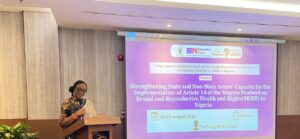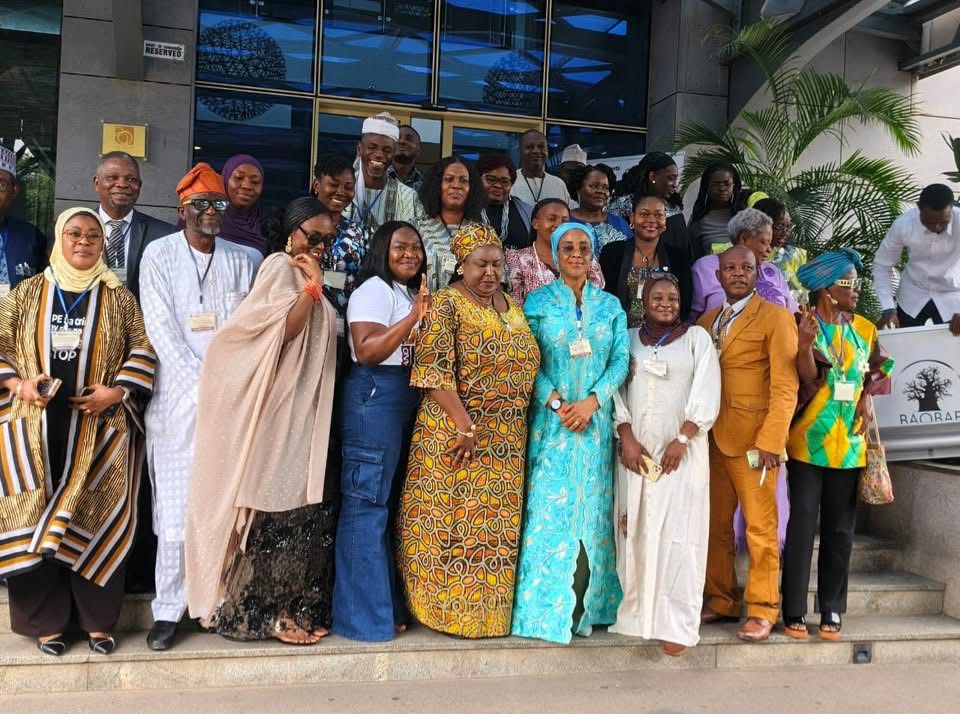“This protocol is key to improving the reproductive power and rights of women……,”said Yeye Bunmi Dipo Salami, Executive Director of Baobab for Women’s Human Rights.
By Mariya Shuaibu Shuaibu
Civil society leaders, legal experts, religious figures, media practitioners, and policymakers have raised their voices once again, urging Nigeria to domesticate and fully implement Article 14 of the Maputo Protocol — a provision that enshrines the sexual and reproductive health rights of women and girls.
This renewed call was the central focus of a two-day Capacity-Building Forum on Article 14 of the Maputo Protocol on Sexual and Reproductive Health and Rights (SRHR), held at the Envoy Hotel, Abuja, from August 5–6, 2025. Convened by Baobab for Women’s Human Rights in partnership with Equality Now and the Solidarity for African Women’s Rights Coalition (SOAWR), the forum brought together state and non-state actors to craft stronger advocacy strategies for advancing SRHR in Nigeria.
Nigeria has ratified, but not domesticated
Article 14 of the Maputo Protocol — a landmark African Union treaty provision — affirms women’s rights to control their fertility, access family planning, be protected from sexually transmitted infections, and, under specific conditions, obtain safe abortion services. It is also the first international human rights instrument to explicitly recognize abortion as a right in cases of rape, incest, sexual assault, or when a pregnancy endangers the health or life of the mother or fetus.
Although Nigeria ratified the Maputo Protocol in 2004, domestication into national law has yet to happen, a legal gap that continues to limit its real impact on the lives of women.
“Ratifying the protocol, even though it is a practical step, does not change the lives of women and girls in Africa,” said Mumbo Mugo, Programme Officer at Equality Now’s Africa Regional Office.
“Domestication means infusing the spirit and provisions of the protocol into national laws and policies. Without it, women remain unprotected, and their rights unfulfilled.” She added.
Mugo identified key obstacles standing in the way, from lack of political will and inadequate resources to deep-seated cultural and religious resistance. She emphasised that bringing traditional and religious leaders into the conversation is vital to dismantling stigma and building wider acceptance of SRHR across communities.
The need for inclusive leadership

For Yeye Bunmi Dipo Salami, Executive Director of Baobab for Women’s Human Rights and Solidarity for African Women’s Rights Anglophone West Africa Lead, genuine progress will only come when leaders — especially men, see women’s rights as central to national progress.
“We want to see men who genuinely care about women, who care about our nation,” Salami said. “Because we know that if women are not included, Nigeria is not going to make the desired progress.”
“We have worked to improve the reproductive power and rights of women in different societies, and this protocol is key to achieving that.” She noted.
Salami called on the government to show real political commitment by fast-tracking domestication, ensuring adequate funding, and integrating SRHR into health and education systems. She also stressed the need for grassroots sensitisation to challenge misinformation and cultural resistance, insisting that sustainable change must start from the community level.
Honourable Uju Onwudiwe, former House Member representing Njaba State Constituency in the Imo State House of Assembly, urged citizens to take ownership of the advocacy effort.
“We have the numbers but we don’t know what we want to do with the numbers. Creating awareness is apt when it comes to this issue,” she said.
From the religious community, Pastor-Is Henry Uzor, Lead Pastor at Victory International Family Assembly, Asaba, Delta State, made a case for balanced and informed education.
“If you come from the religious point of view, every parent, opinion leader like pastors, must learn to educate their children on the issues of sex. We are in the era of technology—if we refuse to, they will go to the internet, so we need to give them the right knowledge. There is a need to balance, to bring the scriptures to modern realities. If the woman is not interested to have sex, a man should not force it. We have to expose the right knowledge to people and help them manage the law and the doctrines.”
Mal. Nurudeen Yusuf Abubakar, a community and traditional leader from Daniya Ward in Bauchi, urged open-mindedness in leadership.
“A leader should be broad-minded and anything that will be beneficial to people should be considered. If abortion is the only option to save the girl or woman, it should be considered,” he said.

The message from the forum was apt, the domestication of Article 14 is not just a bureaucratic step , it is a matter of life and death. Without it, millions of Nigerian women will remain caught in cycles of preventable deaths, unsafe abortions, and restricted control over their bodies. Full implementation would ensure that every woman, regardless of location, can access the healthcare, information, and legal protection she needs to make informed decisions about her reproductive health. Until Article 14 becomes law in Nigeria, the nation’s commitment to dignity, safety, and health for women will remain an unfulfilled promise.


